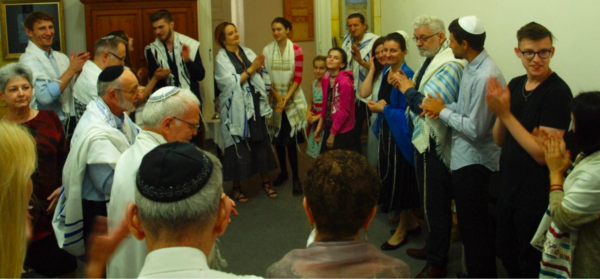Page 11 of 21
At the beginning of the 19th century, Jews constituted almost a half of the city’s population, and until the middle of the century Lublin itself remained the second largest, after Warsaw, center of the Jewish population in the Kingdom of Poland. Between 1819 and 1864 their number in the city increased from
My hometown, Przemyśl, had a very vibrant Jewish history. Here are some historical facts in a nutshell.
In 1875, the first Zionist organization was founded under the name of Ishuv Palestinian. In 1884, the supporters of the tzaddik from Bełz founded the Machzyke Hadas association, and in 1893 a branch of the Chibat
Thoughts on parashat Va’etchanan.
The Torah contains the Divine laws. These laws are our moral and ritual guidelines on how to live a just and happy life, filled with blessings. The core of our moral code is Aseret ha-Dibrot –
Refleksja nad paraszą Wa’etchanan.
Tora zawiera Boskie prawa. Prawa te są naszymi moralnymi i rytualnymi wskazówkami, jak żyć sprawiedliwym, szczęśliwym i pełnym błogosławieństw życiem. Rdzeniem naszego kodeksu moralnego jest Aseret ha-Dibrot – Dziesięć Przykazań, które znajdujemy w paraszy na
Judaism is BACK in Poland and if you are reading this you have an opportunity to really make a difference. Polish people, with Jewish roots, don’t have to make Aliya or move to the states, once they convert, they can stay right here in Poland! They only need a place to call home, where they will learn true Judaism that can be integrated with their
Thoughts on Parashat Matot-Massei.
“Two things are infinite: the universe and human stupidity; and I’m not sure about the universe,” Albert Einstein reportedly said. He also said that “Nothing happens until something moves.” Indeed, constant movement seems to
Refleksja nad paraszą Matot-Masei.
“Tylko dwie rzeczy są nieskończone: wszechświat oraz ludzka głupota, choć nie jestem pewien co do tej pierwszej”. – powiedział ponoć Albert Einstein. Einstein powiedział też, iż „Nic się nie dzieje, dopóki coś się nie
Thoughts on parashat Pinchas.
How should we deal with evil? Should we fight back, respond with a poker face or should we demonstrate proper behavior and do the evildoer a good deed in hopes that he will become aware of the wickedness of his behavior and will return to the right path? The answers to these questions
Refleksja nad paraszą Pinchas.
Jak należy postępować w obliczu zła? Czy powinniśmy żarliwie wobec niego oponować? Zachować pokerową twarz? A może odpowiedzieć wykazując się właściwym zachowaniem, etycznym zachowaniem i zrobić dla złoczyńcy dobry uczynek w nadziei, że uświadomi sobie niegodziwość
Thoughts on parashat Balak.
No man ever steps in the same river twice, for it’s not the same river and he’s not the same man, said ancient Greek philosopher, Heraklitus. This great metaphor says that change is at the essence of everything, both in the world of







